History of WPS
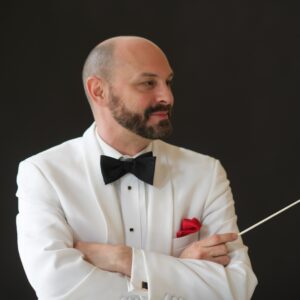
Credit Fanjoy Labrenz Photography 2022
MATTHEW TROY: 2019 - Present
After a national search and the "Maestro's Challenge" in 2018-2019, Maestro Matthew Troy was named Music Director and Conductor of Western Piedmont Symphony.
Organized music in Hickory goes back to the 1940’s. A group of 25 to 30 amateur musicians were assembled by Dr. Robin Gatwood, and they played together on a regular basis.
Albert Chaffoo was leading the Asheville Symphony, and he sent a letter to Charles Jeffers, who was president of the newly formed Arts Council, proposing that a symphony be started in Hickory.
Mr. Jeffers thought the proposition was absurd, but he asked his father-in-law, Mr. T.R. Kramer, about it. He expected laughter in response. Instead, Mr. Kramer said, “Do it! Get the Arts Council to organize it, and I’ll underwrite it.”
He did underwrite it to the tune of $50,000, and at the moment in 1964, the Hickory Symphony was born.

The original WPS logo from 1972
ALBERT CHAFFOO: 1964-1970
1964 marked the beginning of the Hickory Symphony Society, which was the forerunner of the Western Piedmont Symphony. The first board of directors hired Albert Chaffoo as its first conductor and music director. Chaffoo was born in Iraq, but was trained in music in London at the Royal Academy of Music and the Royal College of Music. He came to the United States in 1956 after serving as Director of Music for the Iraqi government. He was the music director of the Asheville Symphony Orchestra before coming to Hickory.
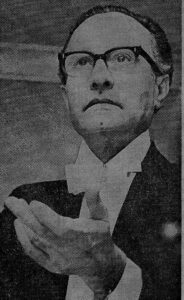
Albert Chaffoo, our founding conductor
In July 1964, the Hickory Orchestra held its first rehearsal on the campus of Lenoir-Rhyne. The first concert was presented on Sunday, October 18, 1964 in P.E. Monroe Auditorium. The Symphony performed three more concerts in its inaugural season. The final concert played to a capacity crowd at P.E. Monroe Auditorium.
Four concerts were again performed in the second season. During this year, the Hickory Symphony Society and the St. Cecilia Music Club sponsored a Mozart Festival for a weekend in 1966. The top attraction was pianist Soulima Stravinsky, son of composer Igor Stravinsky, who performed with the Symphony.
In the third season, the Hickory Symphony was joined by a ninety-voice massed chorus from different churches and community choruses from the area; they performed Handel’s Messiah. When Look Magazine named Hickory an All-American city in early 1968, it cited the Hickory Symphony as part of what made the city noteworthy.
In the fifth season, the Symphony joined with choral groups in the area and performed Mendelssohn’s Elijah in P.E. Monroe. At the end of this season, Albert Chaffoo was hospitalized and was not able to continue as conductor.
MARTIN BELLAR: 1970-1983
After serving as interim director for the 69-70 season, Martin Bellar was named permanent music director and conductor for the Hickory Symphony Society in 1970. Mr. Bellar was a prominent member of the Charlotte music scene.
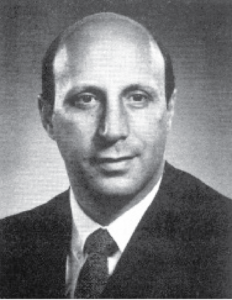
Martin Bellar, our second conductor
At the beginning of Bellar’s tenure, discussion began about expanding the Hickory Symphony into the adjoining counties. In February 1972, the Hickory Symphony was changed to the Western Piedmont Symphony, and on November 3, it was legally incorporated in the state of North Carolina.
In September 1971, Mr. Bellar held an organizational meeting for the Unifour Youth Orchestra, and in January 1972, fifty-six student musicians from eight towns performed a concert. Also, in-school concerts were instituted and were well-received.
In July 1975, Bellar attended the conducting class of the Eastern Institute of Orchestral Studies Virginia. He was one of eleven conductors selected to attend after nationwide auditions.
During this time, various fundraising events were held, and the Symphony began to have paid employees, in addition to the conductor, in the Symphony office. One fundraiser, profitable for at least two years, was the Needlework Fair. The Symphony began to apply for grants at this time also; one $3,000 grant for the purchase of percussion instruments was awarded in 1976 by the Z. Smith Reynolds Association of Winston Salem.
Mr. Richard Hughey came in 1982 as assistant director. He was named director of the Symphony in the spring of 1983, following the resignation of Martin Bellar.
RICHARD HUGHEY: 1983-1990
Mr. Hughey formed the Western Piedmont Quartet from members of the orchestra in 1982 when he was assistant director. This group performed in schools and in other venues, thus adding to the outreach program which continues to grow to this day. He also initiated the Family Concerts in the 88-89 season, again beginning a tradition that expanded audience and outreach.
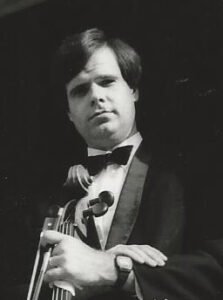
Richard Hughey, our third conductor
In 1987, the First Chair Society partnership was implemented as a major financial source for the needs of WPS. The First Chair Society encourages the highest quality musicians and supports our outreach programs.
Mr. Hughey notably turned the Western Piedmont Symphony into a fully professional orchestra, improving the sound that people appreciated.
After the 89-90 season, Hughey left for a teaching position in Germany. In the 90-91 season, five conductors for the Masterworks concerts and two conductors for the Family Concerts auditioned to become the fourth conductor of the Western Piedmont Symphony. Mr. John Gordon Ross was chosen from this field.
JOHN GORDON ROSS: 1991-2018
John Gordon Ross began his leadership of the Symphony in 1991. Mr. Ross, from Selma, Indiana, came to Hickory from Kingsport, Tennessee, where he was conductor of the Kingsport Symphony Orchestra from 1981-1991. Prior to that stint, he served in various positions with the Cleveland Philharmonic Orchestra and the Canton Symphony Orchestra. When the Rosses moved here, his wife, Sally Rocco Ross, became the associate principal cellist and the Director of Strings for Hickory Public Schools.
Because Ross believed in balancing purely classical music with more modern music, he has attracted significant American artists and composers to Hickory for Masterworks Concerts. In the first three years, Ross had Riders in the Sky, Judy Collins and the Lettermen. Subsequently, he had Edgar Meyer, the Kruger Brothers, Bela Fleck, Willie Nelson, Charlie Daniels and many more.
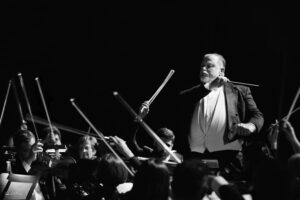
In 1997, because Ross had a reputation for promoting American music by living composers, a representative of the E. Rhodes and Leona B. Carpenter Foundation approached WPS about being the lead partner in a 3-year composer residency under the aegis of Meet the Composer, Inc. WPS, along with Hickory Museum of Art, Hickory Public Library, and Lenoir-Rhyne College selected Dr. J. Mark Scearce for the residency. The Hickory Metro was the smallest market ever chosen for a full-time composer residency.
While he was here, Scearce composed many works which were premiered by WPS. By the end of the 2018-2019 season, WPS or affiliated quartets had performed over forty premiers.
Chamber Classics began in 1982, but WPS launched its first resident quartet in the 1999-2000 season. The first residency was supported by a Rural Residency Grant from Chamber Music America and the National Endowment for the Arts. It would later be supported by the Millholland Foundation, which allows WPS and the Metro region to enjoy and profit from having a resident quartet in place. Once the first quartet came to Hickory, the Friends of the Quartet was formed to help with funding.
Fry Street Quartet: 1999-2002
Degas Quartet: 2003-2006
La Catrina Quartet: 2007-2009
Kontras Quartet: 2010-2014
Tesla Quartet: 2015-2019
All members of these quartets have served as principals of their sections at WPS Masterworks, and have presented 4-5 of their own concerts each year. In addition, they have spent countless hours teaching and attending various outreach events.
Outreach expanded under Ross’ leadership. Members of the Symphony and/or quartets have performed in almost every venue one can imagine. A count made after 2017 revealed that musicians had reached 30,000 students, and they had made 85 presentations to a variety of age groups.
During this time, the Suzanne G. and Kenneth Millholland Symphony Award was established to recognize support for WPS at the highest level. A few of the criteria for this award are the level of support in giving to the Symphony, years of participation, level of volunteerism, and overall impact on the music community in our region. The award was initially given to Suzanne and Kenneth Millholland. Subsequent winners were Larry and Barbara Freiman, D’Ann Grell, Adam Neilly, Rhys Samuel, and David Millholland. In the 17-18 season, T.R. Kramer was given this award posthumously.
Under Ross’ leadership, WPS was featured on WDAV, WFDD, South Carolina Public Radio, and with Greg Knight on Performance Today. Four different years WPS placed in national competition, the Professional Orchestral Division of the American Prize Competition: 3rd place in 2011, 2nd place in 2012, and first place in 2013 and 2015.
In 2016-17, John Gordon Ross relinquished leadership of the Youth Symphony, and announced that he would be retiring after the 54th season of WPS in the spring of 2018. His finale was Beethoven’s Ninth, Ode to Joy, a work that Maestro Ross presented on September 28, 1991 in his first Masterworks concert.
